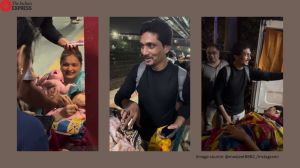Sitting on the fence isn’t an option here
Silikote knows what it is like to fall off the map. Six months ago, this hilly hamlet, just 400 metres from Pakistani sharpshooters perched ...

Silikote knows what it is like to fall off the map. Six months ago, this hilly hamlet, just 400 metres from Pakistani sharpshooters perched on mountains, would go to sleep in the familiarity of gunshots, cries and footsteps of soldiers. But when the Army decided to fence the area on the left of the Hajipeer range to check infiltrators, the village woke up to a new reality — it was caught between the barbed fences and the LoC.
The fencing left out two more villages—Hatlanga and Shoora. The barbed wire structure erected from Sajiwada, the facing village across the Hajipeer stream, left out more than 70 households in the three villages. The reason: the fencing could not be done along the LoC because of heavy shelling. If there was no fencing, there would be massive infiltration. That is the Army’s logic but the villagers are caught nowhere and in the middle of shelling.
|
|
|
|
Squeezed between the fence and
the Line of Control. Javeed Shah |
‘‘We don’t know whether we are on this side or that side, in India or Pakistan. We are in no-man’s land. If my child wants a biscuit tomorrow, I don’t know where I shall send him?’’ said Ghulam Qadir Chalkoo, who looks pensively at the Pakistan picket, just about 400 metres from his mud-and-wood house.Chalkoo, 48, who works in Industrial Training Institute at Lagama, a neighbouring village, lost his wife Saja Begum two months ago to a Pakistani sniper while she was grazing cattle. ‘‘The bullet pierced her stomach. Blood was oozing out of her body but we could not lift her because the firing went on for two hours. Then someone announced on the mosque’s loud-speaker that she was a civilian and the guns stopped. Finally, when we managed to take her to the Uri hospital, she had lost too much of blood. She died leaving eight small children,’’ Chalkoo sobbed.
Chalkoo lost his niece Shamima to shelling, his eldest son Irshad lost his left leg two years ago, and Iqbal, another son, survived a bullet but still carries a wound near his left ear. ‘‘We are living a dog’s life. In fact, a dog’s life is better than ours. He recognises no borders, no soldiers. He can wander aimlessly. We can’t. Our life is made miserable by borders, fencing,’’ he says.
‘‘The Pakistani soldiers kill us, our Army too is leaving us to die at their hands. I want to be on my side but will the Army allow us to move to the other side when the fencing is completed,’’ chips in Ghulam Nabi, Chalkoo’s neighbour.
‘‘When they started work in the village, we asked the ‘bada’ sahib of the Army why they wanted to keep us out of the fence. He told us it was for our benefit to keep a check on terrorists. He assured us that a common gate for the three village would be installed and people allowed to move freely,’’ added Irshad.
Every evening, the Army and local labourers start fencing to avoid detection from the Pakistani posts. ‘‘Since they are on higher reaches, they fire at the workers continuously to disrupt the construction,” said Habibullah, of Hatlanga, a half-hour climb from Silikote. The villagers migrate often to avoid shelling but come back. A Defence spokesman said the villagers don’t have to worry about being left out: ‘‘We would be fencing the area completely and there is no chance of leaving out any villages.”





- 01
- 02
- 03
- 04
- 05

























